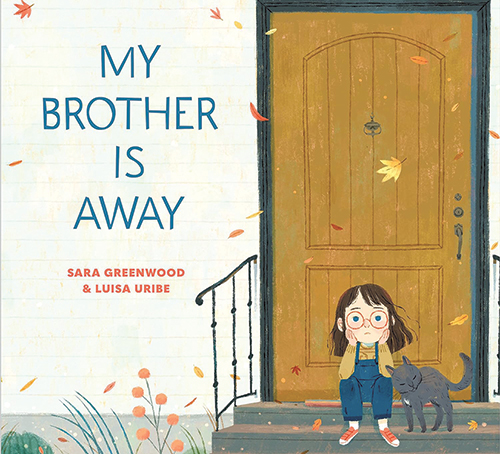
My Brother Is Away
Reviewed by Katie Green
December 1, 2023
By Sara Greenwood, illustrated by Luisa Uribe. Random House Studio, 2022. 40 pages. $18.99/hardcover; $8.99/eBook. Recommended for ages 5–8.
There are quite a few books written for children with incarcerated parents but few for children with incarcerated siblings. Similarly, there are few statistics on the effects of having an incarcerated sibling. Juleyka Lantigua-Williams’s 2016 article “When a Sibling Goes to Prison,” published in The Atlantic, cites a UK-based study that concluded 80 percent of the research on the effects of incarceration in the family does not ask how siblings are coping with the separation. These children are often overlooked, even though they may suffer emotional distress. Children who have an incarcerated older sibling are at risk of becoming offenders themselves. They are apt to experience bullying from other children who know about the incarceration. They are likely to have feelings of confusion, shame, and embarrassment, and often have increased responsibilities in their household.
Sara Greenwood’s book speaks to these children. Greenwood writes from her own experience. Her older brother was arrested when she was in first grade. He was in prison for about seven years. When people asked where her brother was, she gave the standard answer: “My brother is away.” A fellow Brownie confronted her: “I saw your brother on the news. . . . He did something bad.” A similar event happens in the book, which centers around a young unnamed girl, when another child at school says the same words at recess. Through tender remembered moments—an affectionate nickname, learning to fly a kite together—the reader gets a sense of how loving the relationship is and how difficult it is for the girl to miss him. When she and her parents travel to the prison to visit her brother, she realizes their close relationship has not changed, and that she is not alone in the experience of having a sibling in prison.
Luisa Uribe’s vibrant artwork builds meaning and enhances feelings of comfort, providing a soothing reading experience. While it is true that in the United States Black people are incarcerated at state prisons at nearly five times the rate of White people, this book features a White family. I quickly reviewed my bibliography of books for children with incarcerated parents to find that the illustrations were primarily of Black families. We are reminded that White children can also have an incarcerated family member. Additionally the publisher has released a Spanish edition: Mi Hermano Está Lejos, translated by Maria Correa.
This book is a National Council of Teachers of English (NCTE) Charlotte Huck Award Honor Book and an NPR Best Book of the Year. According to the latest data from the Annie E. Casey Foundation, nearly five million children in the United States have had a parent incarcerated at some point in their lives. Friends are likely to know a child in this position; children are likely to have classmates with an incarcerated family member. This book will help children with loved ones in prison, and it can help other children and adults become more aware and empathetic about what some people are experiencing. This is an excellent book to include in the First-day school library.
Katie Green is a member of Clearwater Meeting in Dunedin, Fla., and maintains connections with New England Yearly Meeting. While living in Massachusetts, Katie served as clerk of Worcester (Mass.) Meeting. She is a facilitator with the Alternatives to Violence Project (AVP) and coordinated the AVP program for ten years in a Massachusetts state prison.
1 thought on “My Brother Is Away”
Leave a Reply
Comments on Friendsjournal.org may be used in the Forum of the print magazine and may be edited for length and clarity.



I’m sorry there is a need for this book, but I’m happy someone filled it. I can imagine a child finding so much comfort in this story — and since you mentioned race, it’s easy enough for publishers to offer multiple versions of the same book, with skin and hair changed for print on demand versions. Finally, as a woman in her 60s with a brother in prison, I can say that the “feelings of confusion, shame, and embarrassment” are just as real for adults as children. The stigma never goes away! I guess we just have better coping skills.